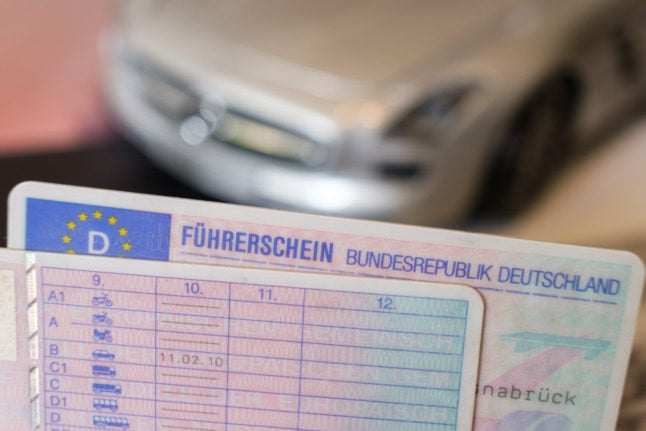Perhaps you’re dreaming of a road trip up to the Ostsee or down to the Schwarzwald. Or you simply want to know you’ll be able to hop into a car and drive legally in Germany.
If so you’ll need to think about changing your UK licence for a German one.
When do I need to change my foreign licence?
If you have driving licence from a state that is not a member of the EU or the EEA, then the general rule is that the licence will be valid for six months after you’ve taken up residence in Germany (likely your registration date).
That means you can drive in Germany with your original licence without having to change it during this time.
After this time period, your driving licence is no longer recognised by German authorities. The conditions on how to get a German driving licence vary depending on which country you got your licence in. The best thing to do is to talk to your local driving licence authority.
If you’re caught driving without a valid licence, you could face steep fines and punishments.
READ ALSO: What you need to know about getting a German driving licence
There is no obligation to change your licence of course. This only applies if you’re planning on getting behind the wheel in Germany, or would like to have it.
If you’re 18 or older and have a licence which was issued from a member state in the European Union (EU) or the European Economic Area (EEA), you can drive motor vehicles in Germany of the category that’s indicated on your licence without restrictions.
If it’s on the verge of expiring or for whatever reason you’d prefer to exchange it, you can get your hands on a German one of the same category upon request.
So what does this mean for Brits?
If you were living legally in Germany before the end of the Brexit transition period on December 31st 2020 then you should have exchanged your UK licence for a German one by June 30th 2021.
If you didn’t then your UK licence is not valid for driving in Germany, and you’ll have to exchange it for a German one if you want to drive.
Due to the pandemic, some states, including Berlin, North Rhine-Westphalia and Thuringia extended the amount of time for foreign drivers in Germany to change their licence. However, it depended on each federal state, and the latest deadline for changing the licence was likely October 21st 2021.
If you moved to Germany recently to become resident, then you’ll have six months from this date to change your licence.
Do I need to take a new driving test?
The good news is: no. UK licence holders do not have to take another driving theory or practical test to swap their licence for a German one.
The German government Transport Ministry says: “Holders of a UK driving licence wishing to convert it into a German driving licence may currently do so without having to take a theory or practical driving test.”
That’s because Germany is entering into a corresponding reciprocal agreement with the UK on this matter.
READ ALSO: Do I need to swap my UK licence for a German one?
It’s a major relief for Britons in Germany who feared they would be asked to redo their practical or theory test to get a new German licence.
Does it cost any money to change my licence?
Yes. The cost of exchanging your driving licence varies around Germany but is roughly around €35 to €40.
You may also need to get your licence translated, but check with your local authority. The city of Munich, for instance, says “translation of the foreign driving licence” is a requirement.
“If you have an EU/EEA driving licence, a translation is only required if it is issued in Greek or Cyrillic,” adds the city.
Translations have to be prepared by certified interpreters or translators.
In Berlin, you don’t have to get it translated from English.
“A translation is always required if the driving licence is not issued in German or English,” says the Berlin authorities. “In case of doubt, the driving licence authority decides whether a translation of the foreign driving licence is required.”
If I change it, have I lost my British licence forever?
Keep in mind that you can use your German licence in the UK for visits. If you want to change it back to a UK licence, you can do that without taking a test. That could be the case if you go back to live in the UK.
What else should I know?
You should also keep in mind that an International Driving Permit can’t be used as an alternative to exchanging your licence.
The UK government also points out that you’re not allowed to renew or replace your UK licence if you live somewhere else. So that could pose difficulties if it is not valid at the time of application for the German licence.
Meanwhile, if you have a UK Blue Badge (for people with disabilities), when you move to Germany it will remain valid. When it expires, you can apply for a German Blue Badge. Contact your local authority for more information.
What kind of documents will I need to exchange my licence?
A typical requirement is that you have to be a resident in the city/town where you’re applying. You’ll also have to fill in an application form.
Other documents needed to exchange your licence will include:
-
your passport/ID
-
a certificate of registration of residency (Anmeldung)
-
a current photo that must fit the size and style required
-
your valid UK driving licence (original may be required too)
There may be other requirements such as certificates of physical and mental fitness, as well as medical examinations of vision, depending on the category of licence you are getting.



 Please whitelist us to continue reading.
Please whitelist us to continue reading.
Member comments